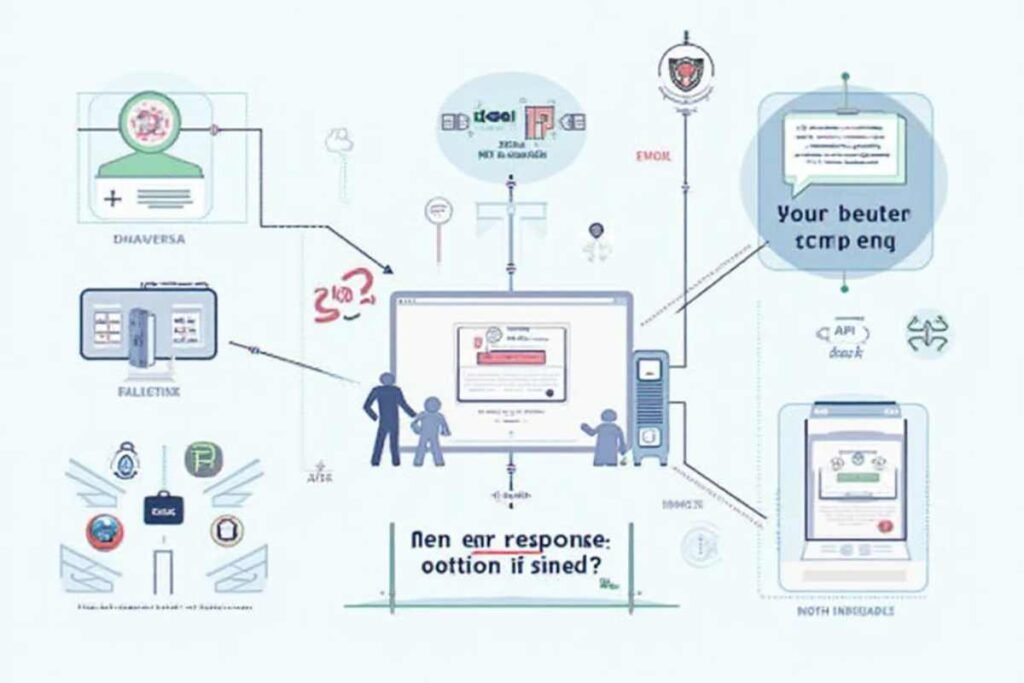When browsing the internet, encountering an error like Net::err_http_response_code_failure can be confusing and frustrating. This technical issue prevents websites or apps from loading properly and can occur in browsers like Google Chrome Firefox or on Android devices. Understanding what this error means why it happens and how to fix it is essential for both everyday users and developers.
The Net::err_http_response_code error typically appears when a browser or application receives an unexpected or invalid HTTP response from the server. It indicates a communication breakdown between the client your browser and the server hosting the website. In this detailed guide we’ll explore what causes this problem and provide proven methods to resolve it permanently.
What Is Net::err_http_response_code_failure?

The Net::err_http_response_code_failure is a browser or network-related error message that usually appears in the console or developer tools. It signifies that the HTTP request made by the client didn’t receive a successful response code such as 200 OK from the server. Instead the response might have been a 4xx client error or 5xx server error leading to a failed connection or data fetch.
In simpler terms your browser tried to load a resource but the server responded with an error or an invalid status code. This makes it impossible to display the webpage correctly. The issue is often linked to broken APIs CORS misconfigurations or backend response problems.
Why the Error Matters for Web Performance?
The Net::err_http_response_code_failure doesn’t just affect functionality it impacts user experience and SEO ranking. Broken requests slow down page loading, reduce Google indexing efficiency and can cause resource failures like missing images or scripts. Fixing this ensures faster page loading, better performance and improved search visibility.
Understanding HTTP Response Codes
To understand the Net::err_http_response_code_failure error, you first need to grasp the meaning of HTTP response codes. These codes are returned by a server whenever a browser sends a request for a webpage or file.
- 1xx (Informational): Request received and being processed.
- 2xx (Success): Request completed successfully 200 OK is most common.
- 3xx (Redirection): Resource moved to another location.
- 4xx (Client Error): Issue with the user request, like 404 Not Found.
- 5xx (Server Error): Issue on the server side such as 500 Internal Server Error.
When you see Net::err_http_response_code it usually means the server didn’t respond with a successful 2xx code. Instead a 4xx or 5xx code was received leading to the failure.
Common Causes of Net::err_http_response_code_failure?
Several technical and network-related issues can trigger the Net::err_http_response_code_failure error. Some of the most software-development-practices/ frequent causes include:
Invalid Server Response
If the server sends back a malformed or incorrect HTTP response, the browser cannot interpret it correctly, causing the error.
CORS Policy Restrictions
Cross-Origin Resource Sharing (CORS) errors occur when a web application tries to access resources from a different domain without proper permission headers.
Browser Cache Corruption
Sometimes outdated or corrupted cached files lead to mismatched responses, triggering this error.
Faulty API Calls
When APIs return an error code or missing response, the browser flags it as Net::err_http_response_code.
Plugin or Extension Conflicts
Browser extensions, especially ad blockers or privacy tools can interfere with server responses.
Server Misconfiguration
Improper settings in server headers, SSL certificates or proxy configurations can cause failed requests.
How to Fix Net::err_http_response_code_failure?
Let’s go through the step by step solutions that can help you fix the Net::err_http_response_code error on Chrome Android or websites.
Clear Browser Cache and Cookies
Corrupted cache or cookies can block certain HTTP requests.
To fix this:
- Open Chrome.
- Go to Settings Privacy and Security Clear browsing data.
- Select Cached images and files and Cookies.
- Click Clear Data.
After clearing restart your browser and check if the error persists.
Disable Browser Extensions
Extensions sometimes inject scripts that cause HTTP request errors.
Fix method:
- Type
chrome://extensions/in the address bar. - Disable all extensions.
- Restart your browser and test the page.
If the issue disappears re enable extensions one by one to find the culprit
Verify API Endpoints
If the error occurs in API calls, check whether your endpoint URLs are valid and properly formatted. Use tools like Postman to confirm that the server returns a 200 OK response. If the API returns 404 or 500 errors fix the backend routes or handle exceptions appropriately.
Update Browser or Application
An outdated browser may misinterpret modern response codes or headers. Always keep your browser and web applications up to date to avoid compatibility issues.
Restart the Network Connection
Sometimes network glitches lead to incomplete responses. Restart your Wi-Fi router or switch to a different network and reload the page.
How Net::err_http_response_code_failure Affects Web Applications?

The Net::err_http_response_code_failure error can significantly impact the performance of modern web applications. When this error occurs the browser fails to fetch necessary resources like scripts stylesheets or data from APIs resulting in broken layouts or missing functionality. Applications that rely on dynamic content such as dashboards single page apps or login systems can fail to load entirely.
This also affects real time updates leading to blank pages or unresponsive elements. For developers understanding this behavior is crucial because even a single failed request can disrupt the user experience reduce trust and affect overall engagement metrics on websites.
Net::err_http_response_code_failure in Chrome
In Chrome, this error commonly appears in the Developer Console F12 → Console tab. It usually happens during fetch or XMLHttp Request calls.
To fix it:
- Open DevTools and check the Network tab.
- Look for failed requests and examine the response codes.
- If CORS or authentication issues are visible adjust the server headers.
Impact of Net::err_http_response_code_failure on SEO
The Net::err_http_response_code_failure error indirectly affects SEO performance because search engine crawlers rely on valid HTTP responses to index web pages. If the server consistently returns bad response codes Google and Bing may skip indexing your site or mark it as unreliable. Broken requests can also delay content rendering increasing bounce rates and reducing Core Web Vitals scores.
Websites that frequently trigger this error may appear slower or less secure negatively impacting search rankings. Therefore resolving this error promptly is essential to maintain crawlability indexing consistency, and overall website reputation emerging-technologies/.
Fixing Net::err_http_response_code_failure on Android
Mobile browsers can also experience this issue due to poor caching or network interference. To resolve it:
- Clear Chrome app data: Go to Settings → Apps → Chrome → Storage → Clear Cache/Data.
- Update Chrome to the latest version.
- If you’re using Wi-Fi, switch to mobile data or vice versa.
- Restart the phone.
Server Side Troubleshooting for Developers
If you manage the backend you must check your response codes and error handling mechanisms.
Use Proper HTTP Status Codes
Always return the correct status codes for each request. Avoid generic 500 responses.
Enable Error Logging
Check your server logs to identify where the failure occurs.
Validate Response Format
Ensure responses include valid JSON or HTML content as expected by the client.
Advanced Debugging Techniques
If none of the above methods work, use advanced tools like:
- Wireshark – To analyze network packets.
- Postman – For API testing.
- Fiddler – To monitor HTTP/HTTPS traffic.
These tools help identify where the request breaks down and which response code causes failure.
Common Misconceptions About Net::err_http_response_code_failure

Many users mistakenly assume that the Net::err_http_response_code_failure error only indicates a browser issue. In reality, it can also stem from backend logic problems incorrect MIME types or failed third party integrations. Another misconception is that refreshing the page always fixes it while this might temporarily reload cached files it doesn’t address the underlying server miscommunication.
Understanding that this error can appear across APIs mobile apps and web platforms helps users approach it more intelligently ensuring that both frontend and backend layers are examined during troubleshooting.
Conclusion
The Net::err_http_response_code_failure error may seem complex but with the right approach its fully resolvable. Whether its a browser issue API misconfiguration or server side problem understanding the root cause is the key. Clearing cache checking CORS headers validating API responses and maintaining proper server configuration can permanently fix the issue.
Keeping your browsers and applications updated and ensuring clean network communication will help you avoid such interruptions in the future. With this guide, you can confidently handle and prevent Net::err_http_response_code_failure on any platform or device.
FAQs
What does Net::err_http_response_code_failure mean?
It means the browser didn’t receive a valid HTTP response from the server often due to invalid or missing response codes.
Is Net::err_http_response_code_failure a serious issue?
Not critical but it disrupts web page loading and API calls. Fixing it improves functionality and user experience.
How can I fix Net::err_http_response_code_failure in Chrome?
Clear cache disable extensions check CORS headers and ensure the server returns correct response codes.
What if Im a developer facing this during API testing?
Validate your endpoints response codes and CORS policies using tools like Postman or Chrome DevTools.


